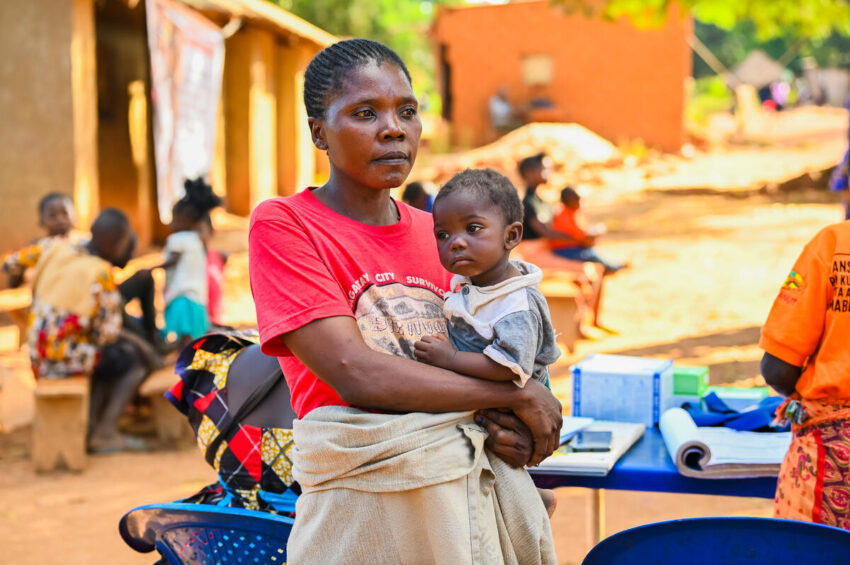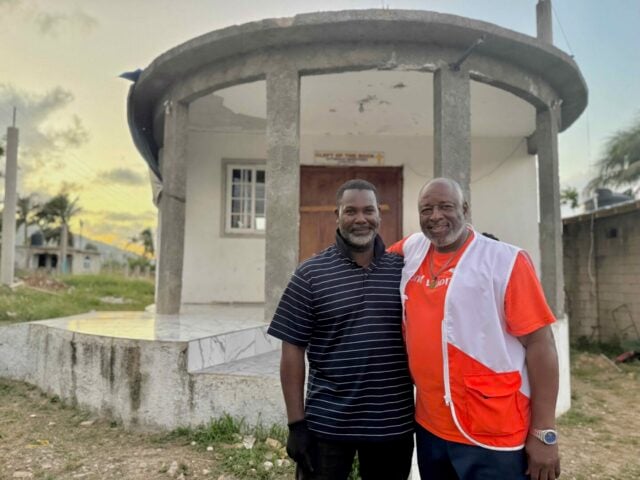On August 14, 2024, the World Health Organization (WHO) declared a global health emergency due to an outbreak of mpox, a virus now spreading across more than a dozen African countries. At least 13 nations in Africa have reported cases, with the Democratic Republic of the Congo (DRC) accounting for over 15,600 cases and 537 deaths in 2024 as of mid-August. World Vision has expressed deep concern for children, who are most at risk of severe outcomes from a more deadly variant of mpox.
Mpox: Facts, FAQs, and how to help
- Fast facts: Mpox outbreak
- What is mpox, and how does it spread?
- What are the symptoms?
- Who is most affected by mpox?
- Who is most at risk of mpox?
- How is World Vision responding to the mpox outbreak?
- How can I help children and families impacted by outbreaks like mpox?
Fast facts: Mpox outbreak
- Mpox is caused by the monkeypox virus and is part of the same family as the virus that causes smallpox.
- Common symptoms include a painful rash, fever, swollen lymph nodes, headache, muscle aches, and low energy. The rash can last up to four weeks.
- The virus spreads through direct contact with infectious skin lesions, bodily fluids, respiratory droplets, and contaminated materials. It can also be transmitted from animals to humans.
- Mpox is commonly found in Central and West Africa but has also spread to other regions, including a significant global outbreak in 2022 and 2023.
- The DRC is currently hardest hit, with children most at risk: 39% of the reported mpox cases — and 62% of deaths — as of May 2024 were children under 5.
- Conflict in the DRC is putting populations at increased risk, as displaced people are often forced to live in crowded camps where close physical contact is inevitable and sexual violence levels are high.
- Several DRC provinces are hotspots, including South Kivu and South Ubangi, where World Vision has active programming.
- On August 15, 2024, Sweden confirmed its first case of this deadlier version of mpox, marking the first occurrence outside of Africa.
“This is something that should concern us all … The potential for further spread within Africa and beyond is very worrying,” said WHO Director-General Tedros Adhanom Ghebreyesus.
What is mpox, and how does it spread?
Mpox, a virus similar to smallpox but less contagious, is endemic to Central and West Africa. It spreads through close contact with infected animals or people, as well as through the consumption of contaminated meat. The virus can also be transmitted through sexual contact and poses a risk to unborn children if a pregnant mother is infected. There are two types of mpox: clade I, which causes more severe illness and deaths, and clade II, which is less severe and has a higher rate of survival.
The WHO notes that, in this most recent surge, “Several outbreaks of different clades of mpox have occurred in different countries, with different modes of transmission and different levels of risk.”
What are the symptoms?
The signs of mpox include fever, headache, muscle aches, and a blistering rash that develops into pustules before scabbing over. These symptoms can last two to four weeks. The disease is especially dangerous for young children, people with weakened immune systems, and those with other health conditions such as HIV.
Who is most affected by mpox?
The Democratic Republic of the Congo is facing the most severe impact, with 15,600 reported cases and 537 deaths in 2024 as of mid-August. This crisis is compounded by ongoing conflict and humanitarian challenges in the country. The disease has also spread to 13 other African nations, including Burundi, Kenya, Rwanda, and Uganda — all reporting cases for the first time.
Who is most at risk of mpox?
Women and children are particularly vulnerable, with reports of newborns contracting the virus in overcrowded hospitals. Health workers are witnessing entire families, including very young children, contracting the disease.
Nearly 70% of cases in the DRC are in children under 15, who also account for 85% of deaths, according to officials at the Africa Centers for Disease Control, as reported by the Associated Press.
Aline Napon, national director of World Vision in the DRC, said, “Children are particularly vulnerable to mpox, especially in low and middle-income countries, including those suffering humanitarian crises and where health and social services are weak or non-existent.” She added that children are especially at risk in refugee camps, overcrowded urban settlements, and areas afflicted by malnutrition, lack of clean water and sanitation, and inadequate health services.
How is World Vision responding to the mpox outbreak?
World Vision has decades of experience in responding to health emergencies worldwide. We’re prioritizing our mpox response in impacted countries, drawing on our extensive experience in responding to the COVID-19 pandemic and Ebola outbreaks. Our efforts will focus on the following critical areas:
- Raising public awareness: Partnering with local organizations, faith leaders, and community health workers to educate communities on how to recognize and prevent transmission, understand symptoms, and detect illness early. This proactive approach also helps tackle misinformation and reduce stigma.
- Promoting hygiene: Encouraging regular handwashing, avoiding contact with infected people, and using personal protective equipment (PPE) to limit the spread of disease.
- Enhancing surveillance and early detection: Strengthening surveillance systems to ensure timely referrals and health responses, especially in areas with limited healthcare services.
- Prioritizing supplies and vaccination: Providing necessary supplies and vaccinations to the most at-risk populations, including those living in humanitarian settings.
- Supporting dignified burials: Ensuring that burials are conducted with dignity and respect, honoring the deceased and their families.
“We need to move quickly to prevent this virus spreading across Africa and beyond,” said Jennifer Neelsen, World Vision’s mpox emergency response director. “That means we must advocate for vaccination production to be scaled up and shared with affected countries. We need to educate vulnerable communities on how to stay safe. We must ensure families have access to clean water and sanitation facilities and know how to spot the disease and get treatment quickly.”
How can I help children and families affected by mpox and other emergencies worldwide?
- Pray: Join us in praying for all those affected by the mpox outbreak:
Dear God, we lift up children and adults currently living in areas where mpox is present. We ask for Your protection over them, so that they and their communities stay safe. We especially pray that the virus does not spread in refugee and displacement camps, where hundreds of thousands of people live in cramped conditions. Father, please protect children, especially those who are malnourished or affected by other illnesses, as they’re the most vulnerable to catching and falling ill from this strain of mpox. Watch over them and shield them. Please strengthen humanitarian workers to scale up their preventative efforts and ensure vaccines are mass-produced and distributed swiftly. Lord God, inspire faith leaders and community health workers to educate and guide communities on how to stay safe.
- Give: Your gift today will help deliver essential care to vulnerable children and families affected by emergencies worldwide.


